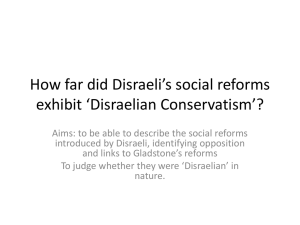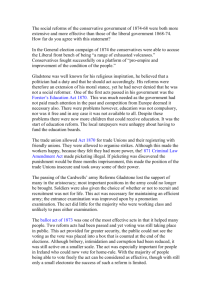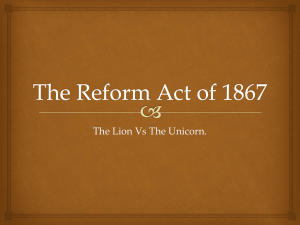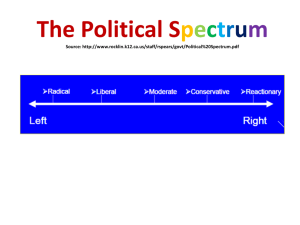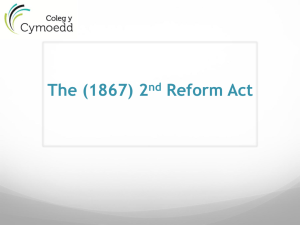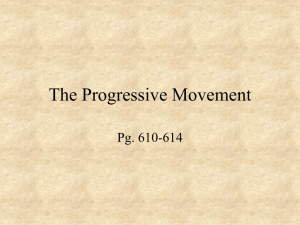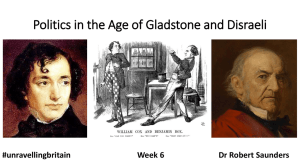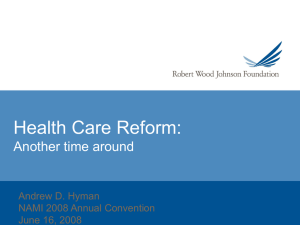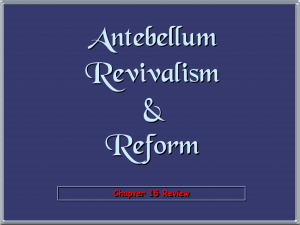DISRAELIAN CONSERVATISM - bedstone
advertisement
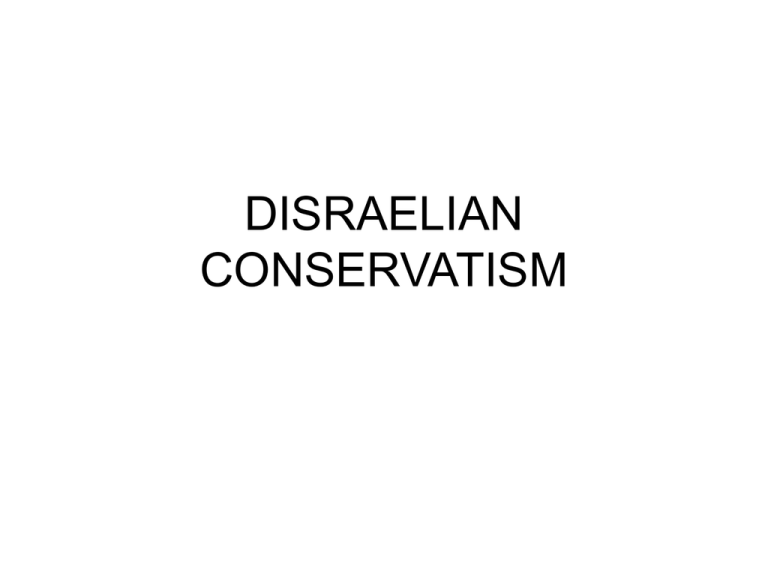
DISRAELIAN CONSERVATISM “The Two Nations” • Sybil, or The Two Nations, 1845 • England was “two nations between whom there is no intercourse and no sympathy; who are as ignorant of each other's habits, thoughts, and feelings, as if they were dwellers in different zones, or inhabitants of different planets: the rich and the poor”. • Influenced by 1789 and by other uprisings. • Conclusion: England ought to be one nation. • Prevents discontent, unrest, and revolution. “Reform to Preserve” • Option 1: Social Change • Remove some of the grosser injustices of society. • Masses happier and grateful to the Conservatives. • Avoids revolution. • Difficult to persuade his party of the merits, but eventually managed. Examples of Social Reform • Largely thanks to Cross, social reform occurs. • Artisans Dwellings Act, 1875 • Public Health Act, 1875 • Sale of Food and Drugs Act, 1876 • Education Act, 1876 • Climbing Boys Act, 1876 Interesting Fact • Disraeli’s method of approach to social change varied. • Sometimes painted it as ‘one-upmanship’ against Gladstone • Sometimes as ‘reform to preserve’ • Sometimes as a heartfelt commitment • Mainly depended on who he was addressing Problems and Reaction • Lack of inspiration from Disraeli – not his area • Mainly developed or altered Liberal ideas • Key difference – much legislation permissive • Well received – “the Conservative party have done more for the working classes in five years than the Liberals have in fifty” – Alexander MacDonald Foreign and Imperial Policy • Option 2: Bring country together through imperial affairs • Disraeli’s main interest • Celebrate glory of Empire – Royal Titles Act – Suez Canal Crisis – 11 Victoria Crosses at Rourke’s Drift • Enhance British standing abroad – Eastern Crisis and Congress of Berlin Problems and Reaction • The stakes were higher – potential for disaster greater (Afghanistan, Isandhlwana) • Necessarily had to rely on regional administrators, such as Sir Bartle Frere / Lord Chelmsford • But potential for glory also greater • Eastern Crisis (“Peace With Honour”) and Suez Canal Shares immensely popular • Public preferred his approach to Gladstone’s Summary Social Reform “One Nation Conservatism” Imperial / Foreign Glory Social Reform “One Nation Conservatism” Imperial / Foreign Glory Permissive Legislation – so as to avoid accusations (levelled at the Liberals) that they interfered too much Reform to Conserve – Conservatives can hold on to most of their privileges if they surrender a few of them Social Reform Noblesse Oblige – Disraeli argued that nobility had a duty to help This will create a “Tory Democracy” where the Conservatives are the first choice of the working class Social Reform “One Nation Conservatism” Imperial / Foreign Glory Echoes of Palmerston in an age when Britain is not unquestionably top nation Enhanced role for Britain hides more unpleasant factors of everyday life Imperial / Foreign Glory Public vote Tory as they associate it with international honour Good way to show real difference between Liberals and Tories After Disraeli • Dies in 1881 • “Tory Democracy” not used as a phrase until 1884 by Randolph Churchill • Also known as ‘villa Conservatism’ (Toryism for people who live in villas) • Much more significant after Disraeli dies as working classes can vote • Now the issue is “reform so as not to lose office” rather than “reform so as not to be killed”

